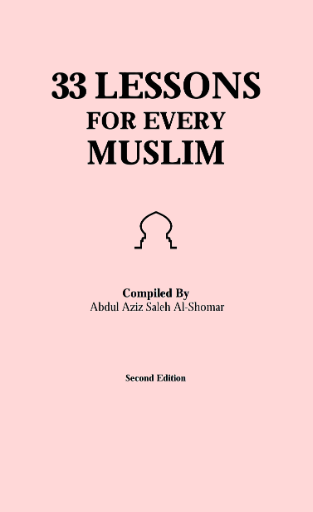Hub For Your Daily Islamic Insights 🕋 🕌

33 Lessons For Every Muslim, A practical guide for Islamic teachings
A practical guide for Islamic teachings
Free
Discover '33 Lessons For Every Muslim'—an indispensable guide for anyone eager to enrich their knowledge and understanding of Islam. Authored by Abdul Aziz Saleh Al-Shomar, this book features thirty-three essential lessons, thoughtfully designed to provide clear, practical guidance on Islamic teachings. Suitable for readers of all ages—from beginners to lifelong learners—it covers foundational concepts and everyday practices, making it a perfect companion for study circles, family reading, or personal reflection. Compact and easy to carry (please specify size, e.g., paperback, 5x8 inches), with a classic, elegant cover design that will stand out on any bookshelf, this book is an invaluable addition to your collection or a thoughtful gift for loved ones embarking on their spiritual journey.
## 33 Lessons for Every Muslim: A Practical Guide to Islamic Teachings Islam is a comprehensive way of life that provides guidance on various aspects of human existence. Whether you are a new Muslim, a lifelong adherent, or simply someone seeking to understand the Islamic faith, this practical guide aims to distill essential teachings into easy-to-understand lessons. Here are 33 key lessons that encompass the core tenets of Islam, ethics, and everyday living. ### Lesson 1: The Oneness of God (Tawheed) Understanding Tawheed is foundational. It emphasizes that Allah is one, unique, and unparalleled in His attributes. Every Muslim must affirm this principle in their heart, speech, and actions. ### Lesson 2: The Importance of Prayer (Salah) Salah is the second pillar of Islam and serves as a direct link between the believer and Allah. Establishing regular prayers five times a day deepens spiritual connection and fortifies faith. ### Lesson 3: The Role of the Quran The Quran is the holy book of Islam, providing guidance, laws, and wisdom. Muslims should read, understand, and apply its teachings in daily life, cultivating a relationship with it through recitation and contemplation. ### Lesson 4: Understanding the Sunnah The Sunnah, or the practices of Prophet Muhammad (peace be upon him), complements the Quran. Learning about the Sunnah helps Muslims embody the values and actions depicted in these teachings. ### Lesson 5: The Value of Community (Ummah) The concept of Ummah promotes unity and brotherhood among Muslims. Engaging with the community fosters support, love, and a collective commitment to serving one another. ### Lesson 6: Charity (Zakat) Zakat, or obligatory charity, is one of the five pillars of Islam. It purifies wealth and helps those in need. Every Muslim should strive to give at least 2.5% of their savings to support the less fortunate. ### Lesson 7: Fasting (Sawm) Fasting during the month of Ramadan is a spiritual discipline that teaches self-restraint, empathy for the poor, and gratitude for Allah’s blessings. It’s a time for reflection and increased devotion. ### Lesson 8: The Importance of Intention (Niyyah) All actions in Islam should begin with a sincere intention. The concept of Niyyah emphasizes that the quality of one’s deeds depends on the intention behind them. ### Lesson 9: Seeking Knowledge Islam encourages the pursuit of knowledge. It is both a religious obligation and a means to enhance understanding of faith and various aspects of life, promoting critical thinking and informed action. ### Lesson 10: Upholding Justice Justice is a central tenet in Islam. Muslims are called to advocate for fairness in all circumstances, ensuring equitable treatment for everyone, regardless of their background. ### Lesson 11: Respecting Parents The Quran emphasizes the importance of good conduct toward one’s parents. Showing kindness, gratitude, and respect should be a Muslim’s priority when interacting with them. ### Lesson 12: The Value of Honesty Honesty is a key moral principle in Islam. A Muslim should always strive to be truthful in their words and actions, as honesty is essential for building trust and integrity. ### Lesson 13: Forgiveness Islam teaches the importance of forgiveness and reconciliation. Holding onto grudges harms both personal spirit and community. Muslims should seek forgiveness from others and be ready to forgive. ### Lesson 14: Gratitude (Shukr) Gratitude is a vital aspect of faith. Recognizing Allah’s countless blessings and expressing thankfulness fosters a positive attitude and cultivates contentment in daily life. ### Lesson 15: Patience (Sabr) Patience is an ingrained virtue in Islam. Believers are taught to endure hardships with steadfastness, trusting Allah’s wisdom and timing in all matters. ### Lesson 16: The Significance of Modesty (Haya) Modesty in behavior, speech, and appearance is encouraged. Haya exemplifies humility and respect for oneself and others, reinforcing a strong moral character. ### Lesson 17: Ethical Use of Wealth Wealth is a blessing from Allah and should be used wisely. Islam encourages responsible spending, investment in beneficial projects, and sharing with those in need. ### Lesson 18: The Importance of Family Building strong family ties is essential in Islam. Mutual support, love, and understanding among family members create a harmonious and loving environment. ### Lesson 19: The Role of Women Islam honors women, granting them rights and responsibilities. The diverse roles women play in society, from family caregivers to professional leaders, are valued and respected. ### Lesson 20: Avoiding Sins and Temptation Muslims are advised to avoid sinful behavior and surround themselves with positive influences. A strong personal relationship with Allah helps resist temptations. ### Lesson 21: Environmental Stewardship Caring for the environment is a divine responsibility. Islam encourages respect for nature and sustainable practices to protect the earth for future generations. ### Lesson 22: Engaging in Acts of Service Islam promotes altruism and service to others. Engaging in community service strengthens bonds, supports those in need, and fulfills religious obligations. ### Lesson 23: Practicing Gratitude Daily Set aside time each day to reflect on blessings and express gratitude verbally and in prayers. This practice enhances faith and promotes happiness. ### Lesson 24: The Power of Dua (Supplication) Dua is a powerful means of communicating with Allah. Muslims should regularly make dua, seeking guidance, help, and expressing their needs and hopes. ### Lesson 25: Continuity of Worship Worship extends beyond formal prayers. Acts of kindness, honesty, and fulfilling one’s responsibilities are forms of worship that please Allah. ### Lesson 26: Importance of Good Companionship Choose righteous companions who encourage virtue and discourage vice. Good friends can uplift one’s faith and support spiritual growth. ### Lesson 27: Resolving Conflicts Peacefully Islam teaches conflict resolution through dialogue and understanding. Choosing peaceful means promotes harmony within the community. ### Lesson 28: Engaging in Reflection and Self-Assessment Regularly take time for self-reflection, evaluating thoughts, actions, and intentions. This practice helps improve one’s character and fulfillment of duties. ### Lesson 29: Understanding the Concept of Accountability Muslims believe that every action will be accounted for on the Day of Judgment. This belief reinforces the importance of living a righteous life. ### Lesson 30: Maintaining a Positive Outlook Cultivating a positive mindset can lead to greater resilience and joy in life. Trusting Allah’s plan fosters hope and reduces stress in challenging situations. ### Lesson 31: Working Towards Personal Development Strive for personal growth in all aspects of life—spiritually, emotionally, intellectually, and socially. Continuous self-improvement is an Islamic virtue. ### Lesson 32: Embracing Diversity Islam celebrates diversity in culture, language, and thought. Appreciating differences enhances community bonds and enriches one’s perspective. ### Lesson 33: The Pursuit of Peace Peace is a fundamental goal in Islam. Strive to create peace within yourself and in your relationships, reflecting the love and mercy of Allah in your actions. --- These 33 lessons serve as a guide to navigate through life as a practicing Muslim, embodying the core teachings of Islam while fostering personal and communal growth. Embracing these lessons may lead to a fulfilling life that is rich in faith, community spirit, and positive action.
